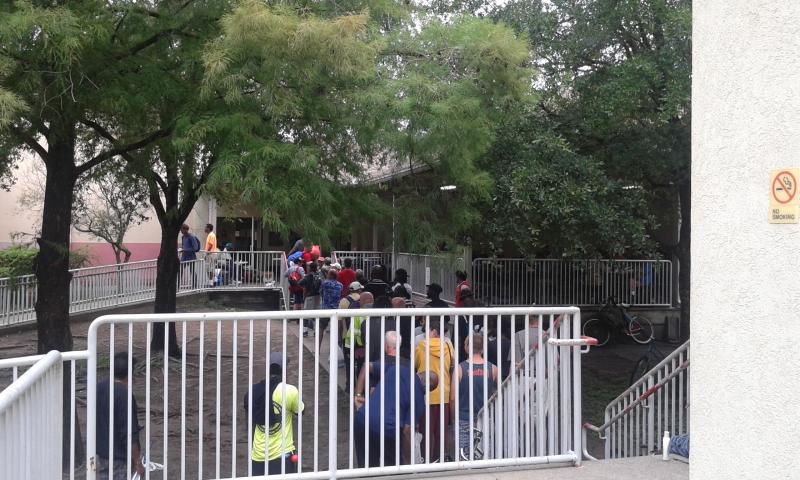While completing a recent application for graduate school I encountered a unique essay prompt. It asked me to imagine that I was approached by a multibillionaire philanthropist who wanted to donate a substantial fund of money to a single project with the goal of "fixing the US healthcare system”; what would I advise and why?
Working on a short timeline my mind raced almost as fast as my fingers Google’d. The problems with our healthcare system are diverse and widespread. How could they possibly be addressed by one project? Still strategizing my response I met with my AmeriBuddy and unwitting muse Ben for our daily lunch. Over spaghetti squash and guacamole, Ben described what he had been doing that morning; helping homeless people apply for health benefits, arranging to get their medication at no cost, and educating them about disease management and prevention. As he nonchalantly rattled off these activities, my essay response became self-evident: the answer is Ben.
There are many well-known projects designed to fix the healthcare system by constructing facilities with the latest technology, pursuing “moon shot” research efforts, and streamlining medical records. While these are desperately needed and fascinating, from my year of service I firmly believe that helping patients overcome healthcare barriers can contribute to fixing the system by creating efficiencies that can quickly yield appreciable results at a relatively low cost.
 For the philanthropist, I decided I would recommend a project designed to increase patient access to primary care, improve understanding of medical advice, and spread knowledge of healthy habits through the placement of lay medical support personnel at federally qualified health care centers (FQHC) in case management, health education, and patient outreach roles. Ben and the rest of my colleagues at the National Health Corps - Florida (NHC-FL) fulfill roles such as these at a variety of institutions designed to aid the underserved. FQHCs should be specifically targeted as they often support the sickest patients with the fewest resources, whom in turn often end up utilizing the greatest amount of resources and place a disproportionate strain on the system (to be forthright, Ben and I serve at an FQHC). The purpose of these positions would be to partner with patients to overcome commonly encountered barriers such as navigating the system, attending appointments, understanding prescriptions, and practicing healthy behaviors is exactly what our NHC-FL team does every day.
For the philanthropist, I decided I would recommend a project designed to increase patient access to primary care, improve understanding of medical advice, and spread knowledge of healthy habits through the placement of lay medical support personnel at federally qualified health care centers (FQHC) in case management, health education, and patient outreach roles. Ben and the rest of my colleagues at the National Health Corps - Florida (NHC-FL) fulfill roles such as these at a variety of institutions designed to aid the underserved. FQHCs should be specifically targeted as they often support the sickest patients with the fewest resources, whom in turn often end up utilizing the greatest amount of resources and place a disproportionate strain on the system (to be forthright, Ben and I serve at an FQHC). The purpose of these positions would be to partner with patients to overcome commonly encountered barriers such as navigating the system, attending appointments, understanding prescriptions, and practicing healthy behaviors is exactly what our NHC-FL team does every day.
The military uses the term “force multiplier” to describe an asset that dramatically increases the efficacy of a primary resource. These lay healthcare personnel would undoubtedly have such an effect on existing primary care resources that identify and prevent costly chronic diseases. To keep costs down so the program is deployable on a large scale, I would recommend working through AmeriCorps. During my year of service, I have often considered how our existing infrastructure could be leveraged to improve health on a greater scale.
While helping patients effectively use the current resources may not holistically fix the system, it would directly alleviate the strain that exacerbates its many other issues. In this spirit, while more Ben’s would not provide an endgame solution to fixing our healthcare system, they would not be a bad place to start.
This blog post was written by NHC Florida member, Alec KInczewski.
Alec serves at the Sulzbacher Center in the Life Skills Department as a Health Educator.
